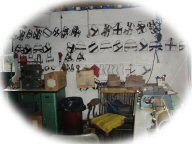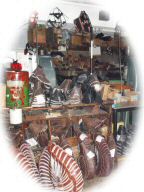Stoney MiddletonThe “Last” Bootmaker(An account of William Lennon & Company Ltd.)
This is a copy of an article published in The Peak Advertiser,
the Peak District's local free newspaper on 24th April 2006 (p33-4),
reproduced by kind permission of its author, Julie Bunting.
THE LAST BOOTMAKERThere was a time when most villages in the Peak had a resident shoemaker, using leather from the nearest tannery. A good pair of boots or shoes made all the difference to everyday comfort, especially in the workplace, and would be repeatedly repaired until there was no life left in them. Poorer people usually had only one pair of shoes to their name, which for the children nearly always meant hand-me-down boots. In the mid-19th century, Bakewell had around ten shoemakers, at least twenty were in business at Wirksworth, nineteen at Matlock, thirteen at Ashbourne, seven each at Baslow, Eyam, Winster and Hartington, and six at both Bradwell and Bonsall. One-man businesses existed in countless other villages. Footwear production was particularly associated with Eyam and Stoney Middleton. Around 1830 the former had nine boot/shoemakers and the latter six, plus one saddler. What began as a cottage industry grew into thriving concerns, employing relatives and neighbours working with simple machinery. Production expanded into disused textile factories and purpose-built premises. The majority of employees were women on piecework; women outworkers at Bradwell and Hathersage took in work from the Eyam factories, machining uppers in their homes. Heavy cutting work on the factory floor was carried out by men, originally by hand with a sharp knife. Later on, sole and heel pieces were stamped out by heavy machinery which invariably claimed at least one finger or thumb from every operator, the price of cutting a dozen pieces of leather per minute. Lads as young as 13 spent long monotonous hours inking boot edges - up to 1,000 pairs a day for four shillings (20p) a week. Girls and women machined the five or six sections of uppers together, often working by the light of candles which they had to pay for themselves. Women grew round-shouldered and developed poor eyesight, while severe breathing problems affected men involved in the final buffing and scouring of leather and brass rivets, when the air was thick with particles of sandpaper, leather and fine brass. Paraffin Power The Eyam and Stoney Middleton factories were featured in The Shoe and Leather Record of 14 October 1898, revealing that ‘handwork largely predominates ... the proprietors aim at substantiality rather than conventionality’. Some factories produced ankle strap and bar shoes, others specialised in heavy nailed boots.
The firm remains in the hands of Les Lennon, who took over in 1989 on the death of his father, Arnold, who in turn had followed his father, William, almost 50 years earlier. William Lennon, an orphan, did not get the best start in life but in 1899 he was sent from Chorlton to Stoney Middleton to become an apprentice at Heginbotham's boot and shoe factory. In 1904 he set up on his own account, renting the former village corn mill to carry out boot and shoe repairs before moving into manufacture. Three other factories in the village were equipped with steam power but the old corn mill waterwheel was long retired. In 1912 William installed a new paraffin engine to power his presses, sewing machines etc. Electricity was installed about 20 years later with the introduction of new machinery. Meanwhile, William had purchased the mill for the sum of £450. Three Generations Three generations of Lennons have seen enormous changes in their trade, yet Les still uses some of the wonderful antiquated machinery used by his grandfather. Much of the apparatus came from factories which had closed down and are now virtually museum pieces. A ‘rapid standard screwing machine’, used here for over 70 years, was manufactured in England by an American firm. Another noisy machine inserts brass screws from a continuous metal roll, while one surreal invention beds in pairs of boots on mechanical ‘walking’ feet. Needless to say, three generations of bootmakers have had to learn to maintain, repair and improvise all these Heath Robinson contraptions.
Learning tricks of the trade is quite an education; for example the best quality leather comes from the ‘steak’ area of a beast, while the neck end of a hide is used for edgings. As for chrome leather, this takes its name from the chromic oxide used in the tanning process to produce a leather which can withstand heat, essential for foundrymen and welders. Lennon's foundry boots are able to resist molten metal without burning through, and have a tough strap at the back to pull off the boot in a hurry. As light relief, so to speak, the current output also extends into fun and fashion. Best sellers include tug o' war boots, with their special non-slip soles, and a stylish printed leather boot currently in demand from the world of show business. Meanwhile, the Ruff-Lander brand with its rhinoceros logo continues to uphold the name of the last safety boot factory in Britain, here on our doorstep in Stoney Middleton.
© Julie Bunting |
|||||||

